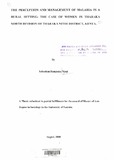| dc.description.abstract | This case study examines the perception and management of malaria among the women
in Tharaka North Division, which is a malaria-prone area of Tharaka Nithi District.
Specifically, the study set out to investigate how malaria is perceived by women; their
knowledge of and attitudes towards modem malaria control technologies; the strategies
women utilize in the management of malaria-related illnesses; and to find out how
intra household gender relations influence women's health seeking behaviour and efforts
in malaria management.
The fieldwork for this study was carried out during the months of July and August 1997.
The field data was collected mainly through structured interviews among 88 women who
were randomly selected through a multi-stage sampling procedure. Additional data was
obtained from 12 purposively selected key informants and also through direct
observations. The obtained data was analyzed using quantitative and qualitative methods
and the results interpreted on the basis of the socialization theory, which served as the
main theoretical frame of reference for the study.
The findings revealed that women's perceptions about malaria are fairly consistent with
the scientific facts about the disease. Their perception about the fatality and severity of
Malaria was however found to be biomedically misplaced which in turn impacted
negatively on their behaviours in malaria management. The findings revealed also that
the local women have a fair knowledge of the existing modem malaria control
technologies, which they also like and highly approve use of. They were, however, found
to have inconsistent and low use of some of these technologies mainly due to financial
limitations.
The Tharaka women were also found to be users of various strategies In malaria
management. These include use of both biomedical and ethnomedical resources
simultaneously, subsequently or alternatively depending on the perceived severity of the
experienced illness episode. They were also noted to rely more on the use of therapeutic
resources based outside home (O'TC drugs and professional health care services) than
home remedies (mostly herbal medicine) in treatment of malaria-related illnesses.
Finally, the results of the study show that women's health seeking behaviour for malaria
and their general control of the disease within households is constrained by many factors.
These include unfavourable intrahousehold gender relations, inadequacy of health care
services and limited finances among others.
The study recommends that the government and other agencies like the NGOs supporting
malaria control intervention programmes, would be best placed to assist the local women
in dealing with the malaria problem by providing them with health education on the
disease and particularly on the appropriate management strategies. In addition, the
women's efforts in malaria control should be enhanced by empowering them
economically and also by minimising the negative impact of other factors acting as
hindrances to their control efforts. | en |

